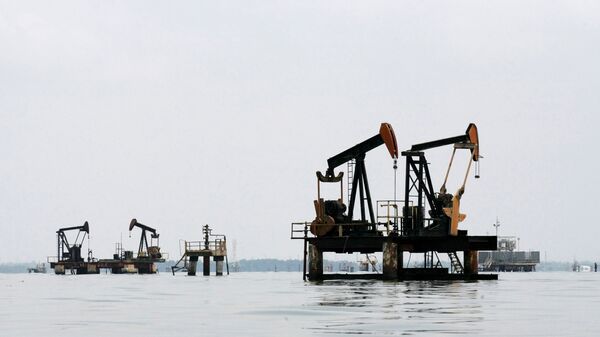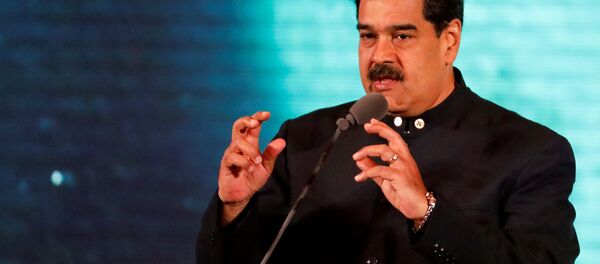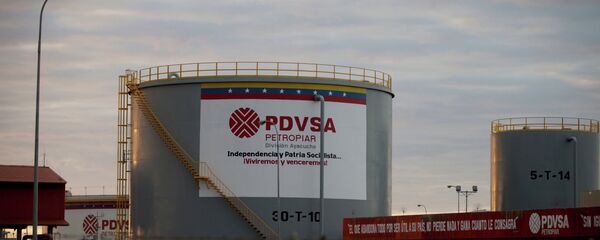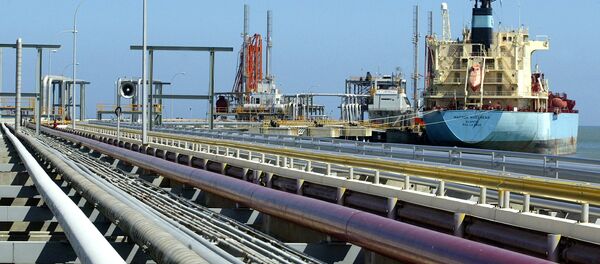Sputnik has spoken about the latest developments in Venezuela with Paul Craig Roberts, a prominent American economist, author and former US Assistant Secretary of the Treasury for Economic Policy under President Ronald Reagan.
Sputnik: What's your assessment of the current White House policy towards Venezuela? What political, economic goals is it striving to achieve? And what would be the benefits now of achieving these goals do you think?
So it's aimed at installing an American puppet that Washington has selected as president, who will privatise the oil company and other resources so that Americans can renew the exportation of the country. The other main purpose is to establish the fact that Washington will not tolerate any reformist government anywhere in Latin America and that the people might as well stop electing someone who represents them instead of American business interest.
So if they can overthrow Maduro and kill the Chavez revolution they will have established that it's pointless to elect a reformist president who tries to serve the people rather than Washington.
READ MORE: US Government's Lies on Aid Trucks "Torched" by Venezuela's Maduro EXPOSED
Sputnik: Now Venezuela has an opposition-controlled National Assembly and a visible opposition, so in your view is Maduro really such a hardline politician as he's often been portrayed in the media? Is it possible to run the country effectively under the sanctions imposed on him? The interesting thing I've mentioned to a couple of experts now, we had Juan Guaido leave the country and do visits to Colombia and Brazil. He was under a judicial order not to leave the country, he didn't comply with that order, he has returned, most experts thought he would've been arrested, but he's been free to return and to carry on with his business, so to speak. That's not really in the order of things from the American point of view, is it?
So that could be one explanation. The other could be that Maduro, like Chavez, are democrats and they tolerate an opposition. In the case of Maduro at the present time, he may be afraid that if he actually does move against this usurper, this Washington agent, that Washington will use it as an excuse for a foreign invasion. I don't know, I haven't consulted with Maduro, but he's in a difficult situation and he's probably trying to be as unprovocative as possible.
READ MORE: German Minister REVEALS Why Guaido Wasn't Arrested Upon His Return to Venezuela
Sputnik: Well, it certainly looks that way in terms of his actions in the last few days. Do you think that's why he's in many ways holding such wide and firm support from the military? Do they perceive him to be a fair leader then in terms of what you've just described but also giving political sway to his opposition as well, it seems pretty democratic in that sense, doesn't it?
Paul Craig Roberts: Yes, that's true and I think it's a weakness of all of those reform movements. They always leave in place the elites and so the elites instantly get into collaboration with Washington and plot the overthrow.
So I think that this sort of weakness on the part of the reform elements leaves them always exposed to failure. If Chavez arrested these people for which he had good legal cause and put them on trial, then I think Maduro would be in a much safer position today. But this sort of weakness is endemic in all of these reformist regimes.
READ MORE: US Envoy Tried to Freeze Made-Up Venezuelan Accounts in Swiss Banks in Prank
It was in 2009 that the Obama regime overthrew the reformist president of Honduras, and I think altogether if my memory is reliable, the United States has had about 68 coups in Latin America over its history. So it simply will not tolerate an independent government.
I think the reason why the Venezuelan military is standing with Maduro is that most of them, of course, are just ordinary people from Venezuela, and what Chavez did by nationalising the resources, he turned the revenue flows to the benefit of the Venezuelan people. There have been amazing drops in poverty rates and amazing increases in literacy, and so they understand that if they stay with Maduro and the Chavez revolution that they will benefit, and if they desert this man it will go back to the American hands and the country will be looted and plundered again.
Views and opinions, expressed in the article are those of Paul Craig Roberts and do not necessarily reflect those of Sputnik.




